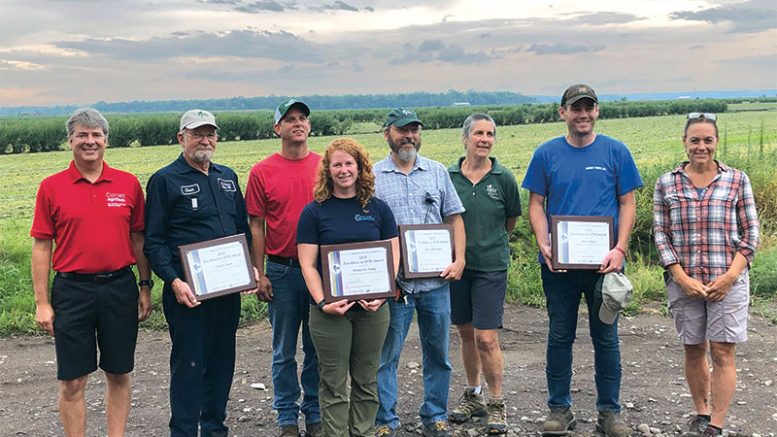Onion Growers Put Skin in the Game, Earn Excellence in IPM Award
Ongoing efforts to better manage thrips have earned honors for a half dozen New York onion growers. Onion growers Matt Mortellaro, Guy Smith, Chuck Barie, Emmaline Long, and Mark and Max Torrey received Excellence in Integrated Pest Management (IPM) Awards from the New York State Integrated Pest Management program (NYSIPM). The six are muck onion farmers in Elba, New York, who meet weekly during the growing season to discuss crop protection tactics.
NYSIPM develops sustainable ways to manage pests and helps people use methods that minimize environmental, health and economic risks. The organization’s IPM award honors individuals who encourage the adoption of IPM in their businesses, schools, communities and farms and who develop new tools and tactics for sharing these practices.
Problem and Solution
In 2005, onion thrips infestations were nearly uncontrollable in New York. Insect populations were resistant to multiple insecticides, and the hot and dry conditions created a worst-case scenario, causing crop losses exceeding 30 percent. The Elba muck growers helped Cornell University researchers conduct dozens of research trials and host largescale demonstrations on their land in an attempt to understand the biology, ecology and management of thrips.
“The result culminated in a practical thrips management program, which includes regular scouting of onion fields followed by sparing use of insecticides designed to minimize resistance,” says Brian Nault, professor of entomology at Cornell AgriTech.
The growers are now able to successfully manage thrips infestations. They average between one and four fewer insecticide applications and have saved an average of $113/acre, which is approximately $6,000 to $226,000 per farm per year.
In addition to regular scouting, the other key tool in the IPM arsenal is information exchange and discussions at what is known as the Muck Donut Hour, which Christy Hoepting, senior extension associate with the Cornell Vegetable Program, describes as a way she keeps her “finger on the pulse” of the pest complex each year. A Cornell Cooperative Extension tradition for over 20 years, the Muck Donut Hour is held weekly during the growing season. There, growers and researchers discuss the latest research findings, scouting and spray reports. Hoepting notes the willingness of the muck onion farmers to entrust their crops to Cornell’s research and their transparency in sharing spray records.
“The Elba growers are undeniably brave; to so wholeheartedly adopt IPM practices demonstrates the extent of their faith in Cornell’s research on their farms,” she continues. “The risk of a pest spiraling out of control in a high-value onion crop is frightening. Clearly, these growers believe in solid science and go above and beyond to support it.”
“Without the cooperation of the Elba onion growers, it is not likely that so many IPM-themed tactics would have been adequately tested under real grower conditions. They set the standard for other growers,” adds Steven Beer, professor emeritus of plant pathology and plant-microbe biology at Cornell.
The Honorees
The onion farmers honored with the award include Matt Mortellaro. The third generation muck farmer co-owns G. Mortellaro & Sons with his brother Paul.
“Matt is a fearless leader in adopting IPM strategies. He is committed to sustainable onion production and environmental stewardship and is a strong advocate of onion IPM,” Hoepting says.
Guy Smith, a fourth generation muck farmer, owns Triple G Farms with his brother Greg and nephew Peter. Smith represents the Elba growing region on the board of directors for the New York Onion Research and Development Program.
Chuck Barie and Emmaline Long are crop production managers for CY Farms LLC, which grows 120 acres in Batavia and Elba. Barie has been responsible for planting, spraying, irrigating and harvesting the onions for over 20 years. Long joined the farm in 2014 after graduating from Cornell; she scouts CY’s entire onion acreage weekly, including counting thrips, to implement IPM. Together, she and Barie make pest management decisions. CY has the ability to micromanage every five- to 20-acre onion field based on each area’s precise pest management needs.
Mark and Max Torrey are a father and son onion growing duo and 11th and 12th generation farmers with Torrey Farms Inc. Max serves as the general manager for Torrey’s onion operation, Big O Farms. As the largest grower in Elba, the Torreys’ pest management practices affect everyone.
“Their commitment to implementing resistance management strategies and following IPM spray thresholds has been instrumental in preserving the longevity of insecticides remaining effective against thrips,” Hoepting says.
Onions grown in muck soil – organically rich former swampland where production practices are unique and intense – are one of the most valuable crops in New York, with an average value of $34.6 million. In the Elba muck and surrounding pockets in Orleans, Genesee and Livingston counties, eight farms produce 40 percent of the New York onion acreage on 3,000 acres. Mortellaro, Triple G, CY and Big O farms account for almost 75 percent of that production.
